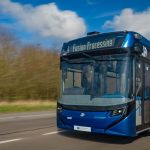Wren Kitchens will soon introduce a wholly-owned commuter coach service for employees at its Humberside facility. routeone gets the full story
Social and environmental responsibility is big business in manufacturing, and coach and bus has a huge part to play in long-term sustainable growth for all kinds of organisations.
That has been recognised by award-winning kitchen manufacturer Wren Kitchens, which is going green – literally – with the purchase of its first wholly-owned commuter coaches, due to enter service later this month.
Lee Thompson-Halls is Wren Kitchens’ National Fleet Manager in charge of the business’ vehicles across seven depots, and takes overall responsibility for the purchase and day-to-day operation of the newly acquired coaches. Buying coaches was new territory for Lee, and rising to the challenge took him to the doorstep of Scania Great Britain, and General Manager Used Bus and Coach, Steve Lambert.

Wren Kitchens and Scania: The background
Wren Kitchens is one of the largest employers in the Humber region and has experienced a surge in growth over the last six months, with further extensions planned for the manufacturing site next year. This prompted the company to look at environmentally conscious transport for the 2,000 plus workers who travel to the facility every day.
It is not the first time Wren has demonstrated responsibility with its transport. At the 2020 Motor Transport Awards the company was awarded the Business Excellence Award for its concept of the triple trunking road train, which reduces the need for three lorries on the road down to one. Lee estimates that concept alone reduced annual road mileage by 66%.
“To support the increase in customer demand, we’ve experienced rapid growth in all areas of the business from logistics, to manufacturing and IT development. Therefore our team has grown considerably,” Lee says. Coaches were an obvious answer.

Coach solution
Two months ago, Wren’s Director of Transport and Logistics approached Lee to investigate new ways to transport staff into the Barton-upon-Humber facility.
Early this year it began hiring coaches to commute workers, but it soon determined ownership was the best route.
After some preliminary research, Lee approached Steve Lambert at Scania. “He listened to my objectives and criteria,” Lee says. “We sat down, discussed our options, and made the necessary compromises. He didn’t act like a salesman – he worked with me as a partner.”
A pair of Scanias were selected on the basis of Wren’s local dealerships; a 2009 OmniExpress on the K 400 chassis, and a 2007 Berkhof Axial on the K 340 chassis. The first coach was delivered on 29 October. Both come with 63 leather seats, re-upholstered to match the Wren branding by Blackpool Bus and Coach Trim, and onboard entertainment systems. They are hooked up to Scania’s r2c fleet management tool, ensuring simple scheduling and compliance.
The eye-catching designs have already been turning heads in the local area, according to Lee. “We have certain standards we stick to with our vehicles, regardless of age or condition. I knew before I even started looking at coaches there was potential to look at retrimming seats and wrapping vehicles in our branding.”
Risk assessments have been completed both for routes and passengers, and strict coronavirus COVID-19 guidelines are in place. Each coach is fitted out with live-feed CCTV to ensure those guidelines are adhered to, while conferring the usual safety benefits to the driver and passengers.
Four drivers have now also been hired and are going through induction and training, until the operation can begin later this month. Pickup points cover both sides of Hull city centre, where the majority of the Wren team live. Tickets at £1 each way can be purchased via a passenger app, making total commuting cost £10 for a five-day week. Wren expects both coaches to be sold out at half-capacity during restrictions.

Environmental impact
Wren’s employees stand to save a great deal with the new service, but the biggest saving according to Lee will be with the wider environmental and social impact. There are already plans in place to grow the fleet and remove even more cars from the local area while providing more reliable transport to its workers.
Equally, Lee plans to offer the coaches on a complementary ad-hoc basis to the local community, such as schools, which the company has long supported and sponsored in various ways. “We fund local football teams, the cricket team, the summer carnival and the local secondary school. As they receive sponsorship from us, offering use of these vehicles seems an obvious route.”
Proud image
 Rising to the challenge of starting a coach commuter service has been a “huge learning curve” according to Lee, but one he has loved. “Feedback I’ve since had from our External Manager, who has been in the coach industry for more than 30 years, indicates that we have made the right choices. You can’t help but feel proud about that.
Rising to the challenge of starting a coach commuter service has been a “huge learning curve” according to Lee, but one he has loved. “Feedback I’ve since had from our External Manager, who has been in the coach industry for more than 30 years, indicates that we have made the right choices. You can’t help but feel proud about that.
“We are very proud of our green ethos and being at the forefront of the industry constantly. We’re not a company that stands still,” Lee says. “And we’re equally proud of every step we take to reduce our carbon footprint, innovate however we can, and constantly look to the future.”


























